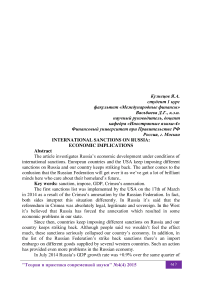International sanctions on Russia: economic implications
Автор: Кузнецов Я.А.
Журнал: Теория и практика современной науки @modern-j
Рубрика: Международные экономические отношения
Статья в выпуске: 5 (5), 2015 года.
Бесплатный доступ
The article investigates Russia’s economic development under conditions of international sanctions. European countries and the USA keep imposing different sanctions on Russia and our country keeps striking back. The author comes to the conlusion that the Russian Federation will get over it as we’ve got a lot of brilliant minds here who care about their homeland’s future.
Sanction, impose, gdp, crimea's annexation
Короткий адрес: https://sciup.org/140266721
IDR: 140266721
Текст научной статьи International sanctions on Russia: economic implications
The first sanctions list was implemented by the USA on the 17th of March in 2014 as a result of the Crimea’s annexation by the Russian Federation. In fact, both sides interpret this situation differently. In Russia it’s said that the referendum in Crimea was absolutely legal, legitimate and sovereign. In the West it’s believed that Russia has forced the annexation which resulted in some economic problems in our state.
Since then, countries keep imposing different sanctions on Russia and our country keeps striking back. Although people said we wouldn’t feel the effect much, these sanctions seriously collapsed our country’s economy. In addition, in the list of the Russian Federation’s strike back sanctions there’s an import embargo on different goods supplied by several western countries. Such an action has provided even more problems in the Russian economy.
In July 2014 Russia’s GDP growth rate was +0.9% over the same quarter of the previous year. It was expected that the total growth that year will be +2.5% and even more. However, at the end of 2014 it’s already been really doubtful… As we can see the growth rate didn’t justify the forecasts. Then sanctions did perform their job so the GDP rate in September 2014 started to fall. Thus in March 2015 the rate fell to -2.2% over the same quarter of the previous year. After that it keeps falling constantly while the USA keeps implementing new sanctions against Russia. Now it’s because of Russia’s recent actions in Syria. That’s why by the end of October 2015 our GDP growth rate is at -4.3% over the same quarter of the previous year.
There’re a lot of issues to deal with. But what can we do about it? Let me share my personal opinion with you. One of the main problems in the Russian Federation is in people’s minds. Nowadays you can suddenly hear someone talking about the dreams of leaving this country. What’s the explanation for this? I don’t know. Maybe, people change their loyalty to the country only when it’s in danger? For instance, in 2014 Sreda (Non-commercial research service) asked different people living in Russia about their attitudes to the country. Studies have shown that in 2 years’ time from 2012 to 2014 the number of the citizens who love the Russian Federation has risen by 15% (56% in 2012 and 71% in 2014). However, in 2014 there was 5% of people who’d like to be born in another country. We think there’re still a lot of people who could change their mind about Russia.
The first sanctions were imposed after the annexation of Crimea by Russia. Such an action has created a lot of problems in our country’s economy. However, one the biggest problems, which is people’s attitudes, seems to be solved soon.
Sanctions have brought a lot of problems to Russia. But the latest news and political events give us some hope. We believe that the Russian Federation will get over it as we’ve got a lot of brilliant minds here who care about their homeland’s future.
All in all, the only way forward is to engage with each other and try to get over the issues together.
Список литературы International sanctions on Russia: economic implications
- http://www.economist.com
- http://www.tradingeconimics.com/russia/gdp-growth-annual/forcast


